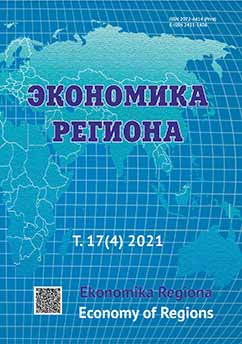Интегрированное управление контейнерной транспортной системой региона
Integrated Management of the Regional Container Transport System
Author(s): Daria I. Kochneva, Vasiliy M. SaySubject(s): Economy, Geography, Regional studies
Published by: Институт экономики Уральского отделения Российской академии наук
Keywords: container transport system of the region; container flow; container block train; logistics chain; integrated management; regional integrator; digital platform; organisational network; collaboration
Summary/Abstract: Nowadays, regional container transport systems operate in the context of incomplete information and lack of integration of economic entities. Pursuance of personal economic gains by companies often leads to an imbalance in the development of regional terminal capacities, irrational empty container flows and a decreased efficiency of the regional container system in general. The present article proposes an approach to the integrated management of the regional container transport system based on the coordinated container flow distribution between terminals. This technology aims to increase the efficiency of the whole system, including due to the flow enlargement and the accelerated container trains formation. The approach involves the data sharing between cargo owners, terminals, the railway and resource owners on a digital logistics platform that forms logistics chains taking into account the transportation geography, infrastructure capacity and the interests of container market entities. The research presents a mathematical formalisation of the optimal container delivery chains by the time criterion, as well as a model of the integrated distribution of container flows between terminals. The model distributes the total container flow generated by a region between the existing terminal facilities in a way to minimise the total time of cargo delivery (taking into account the accumulation time of the full-length container block train at the terminal). The model, tested in the conditions of the container transport system in the Ural region, showed that an integrated management approach reduces the average container delivery time by 5 days due to the flow enlargement and regular container block trains. The effect size depends on the total regional container flow, as the larger number of requests for transportation to a certain destination leads to the accelerated formation of loaded container trains. The proposed technology is of economic interest for various participants of the container transport system. For cargo owners, it reduces the delivery time and, consequently, increases the capital turnover; for container owners, it accelerates the container turnover and reduces empty running; for terminals, it increases the throughput by reducing the accumulation time. To improve the model, it is planned to develop approaches for coordinating not only outgoing, but also incoming container flows between existing terminals.
Journal: Экономика региона
- Issue Year: 17/2021
- Issue No: 4
- Page Range: 1270-1285
- Page Count: 16
- Language: Russian

